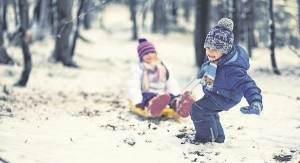On the importance of Vitamin Nature for children

14th of May, 2016
With iPhones, tablets, and laptops children are spending more time than ever glued to screens and this has come at the expense of spending time in nature.
Experts now fear that this lack of contact with the natural world could negatively impact children and they are encouraging parents to get their kids outdoors.
Twenty First Century children might be spending less time in nature but they are just as interested as ever in the natural world. Stephen Moss, natural historian, bird expert and author underlines this paradox:
“More kids today are interested in the natural world than ever before; they watch it on the telly, they may well visit a nature reserve or a National Trust site with their families. But far fewer are experiencing it directly, on their own or with their friends, and that’s what counts: this is about more than nature.”
“There’s a 23% decrease in the number of children who play in fields, a 20% decrease in those who play in wild spaces and a 19% decrease in those who play in the woods” states the Heritage Council research. This loss of contact with nature is representative of our lives today. Western countries are urbanised and nature is seen as a surrounding that we have to control rather than a part of who we are as living beings.
In the school system we value theoretical knowledge but it is not enough for children to be in contact with information. As reminded by Tom Collins during the National water event 2016 : “Every child in school should have access to animals, water and living things.”
Nature allows children to acquire implicit knowledge, they are developing self confidence, reactivity, creativity. Important qualities for the adults they will become. Moreover, the time we spend as children in nature will determined our attachment to nature as adults. That is why environmentalists often fight for what they have been in contact with or what marked them as children.
On the other side, the time spent on screens develop children’s aptitude for multi tasking, they can send texts while watching TV, play video games and chat at the same time, but it also has negative effects on their aptitude to concentrate.
According to Dr Melissa Lem, Professor at the Department of Family & Community Medicine, University of Toronto the high rates of hyperactivity, as well as myopia, asthma, depression and late development in motor and social skills are to be linked with those new habits. At the same time, studies showed the positive impact of spending time outside on children suffering from Attention Deficit Hyperactivity Disorder (ADHD).
It is important not to underestimate the place of nature in children’s lives. They need it to grow, to be happy and to be conscious of their place as human beings in nature. Richard Louv, author of “Last Child in the Woods” shares his concern for those children but also for the future of our human-hood, we need nature as we are part of it, and who knows how long this disconnection can continue?
[x_author title=”About the Author”]








